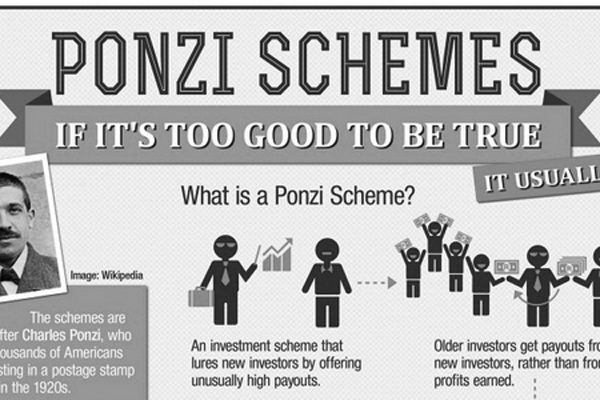
Fraudulent investment schemes come in various forms, the most common being pyramid schemes and Ponzi schemes. Last week we delved into the mechanics of “pyramid schemes” and this week we discuss the evil twin of the pyramid scheme — the Ponzi scheme.
BY CLIVE MPHAMBELA
What are the characteristics of a Ponzi scheme?
A Ponzi scheme is a fraudulent investment operation in which the operators, an individual or organisation, pays out returns to earlier investors from new capital paid into the scheme by new investors, rather than from profit earned through bona fide business sources. Operators of Ponzi schemes usually entice new investors by offering much higher returns than other similar investments. In general, the returns offered are usually abnormally high over short-terms and abnormally or unusually consistent over the long term. Ponzi scheme returns also generally defy other underlying economic fundamentals, such as recessions or economic downturns.
Whilst pyramid schemes are easily disguised as multi-level or network marketing business ventures, a number of seemingly legitimate investment vehicles or strategies, can also become the backbone of Ponzi schemes.
Initially the Ponzi schemer will pay out very high returns to attract more and more investors, and to lure the current investors into putting in additional money into the scheme. Other new investors will begin to participate, attracted by high returns leading to a “cascade effect”. The “investment returns” to the initial investors are paid out of the new investments made by new entrants, and not out of profits of the underlying investment business.
Often the high returns offered will encourage investors to leave their money in the Ponzi scheme, with the result that the promoters do not have to pay out very much to their investors. The scammers simply send regular statements to their victims, showing them on paper, how much they have earned in interest or capital gains. This sustains the deception that the Ponzi scheme is an investment offering high returns.
Ponzi scheme promoters will also actively try to minimise withdrawals by offering new investment products to investors, often leading them to investments where their money is “frozen” for longer periods of time, in exchange for even higher returns. Under such a scenario the promoters reduce cash outflows and enjoy new cash inflows as investors are told that they cannot transfer their money from the first scheme to the second scheme and so forth. Ponzi schemes also cleverly create an illusion of liquidity by maintaining credibility with investors. If an investor wishes to withdraw their money in accordance with the terms of the scheme, the withdrawal requests are usually very promptly processed, giving the illusion to all other investors that the fund is very liquid and in fact solvent when this is far from the truth.
- Chamisa under fire over US$120K donation
- Mavhunga puts DeMbare into Chibuku quarterfinals
- Pension funds bet on Cabora Bassa oilfields
- Councils defy govt fire tender directive
Keep Reading
Why do Ponzi schemes eventually collapse?
Ponzi schemes typically collapse when some external market forces, such as a sharp decline in the economy, a change in regulations, or some other event cause many investors to simultaneously withdraw part or all of their funds from the scheme. Since the scheme requires a continual stream of new investments to fund higher return of past investors, once these investments slow down for any reason, the scheme soon collapses as the Ponzi promoter will start encountering problems in paying the promised dividends to investors. The higher the returns promised, the greater the risk of the Ponzi scheme collapsing. Such liquidity crises often trigger panics, as more people start asking for their money.
What are the similarities and differences between pyramid schemes and Ponzi schemes?
Whilst pyramid schemes as a form of fraud are very similar in some ways to Ponzi schemes, because both types of financial fraud rely heavily on a mistaken belief by gullible “investors” in a nonexistent financial reality, which includes the hope of extremely quick and high rates of return. The underlying tenet why both schemes work is because humans are inherently greedy. They both thrive on a concept in behavioural finance called “the greater fool theory”. However, several characteristics distinguish Pyramid Schemes from Ponzi schemes.
In a Ponzi scheme, the scamsters act as a central “hub” and interact directly and actively with all the victims. In a pyramid scheme however, the recruiter benefits directly from his or her recruits. Each higher level of beneficiaries in the pyramid hierarchy reaps directly from those that join or are recruited after the. It is for this reason that Pyramid Schemes collapse quickly as the failure to recruit new participants typically means that you will not get an investment return.
In a Ponzi scheme, the organisers recruit victims directly and usually discretely. The Ponzi investment scheme typically claims to rely on some esoteric investment approach, some unique ability or access to an unverified investment strategy that yields supernormal returns and often attracts very well-to-do investors. Pyramid schemes on the other hand explicitly claim that new money from new recruits will be paid to earlier recruits who rank higher in the “food chain”. A Ponzi scheme organiser will carefully and discretely pay out capital and returns from older investors with capital contributions from new investors.
A pyramid scheme, therefore, typically collapses much faster because it requires an exponential increase in new participants to sustain it. By contrast, Ponzi schemes can survive simply by persuading ,some of the existing participants to reinvest their money, and can run for long periods with a relatively small number of new participants.
How can you protect yourself from pyramid and Ponzi schemes?
The first thing one must do in order not to fall victim to Pyramid schemes and similar types of financial scams is to check facts with an independent person. Your banker or financial advisor for example may be able to tell a typical Ponzi or pyramid arrangement. Don’t fall prey, smarten up.
Clive Mphambela is a Banker. He writes in his capacity as Advocacy Officer for the Bankers Association of Zimbabwe. BAZ expressly invites stakeholders other stakeholders to give their valuable comments, feedback and questions related to this article to him on [email protected] or on numbers 04-744686/987, and Mobile number 0772206913. Readers can also visit the BAZ website www.baz.org.zw for similar articles and advice.











